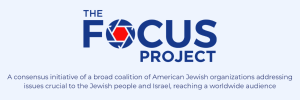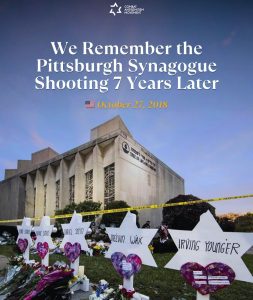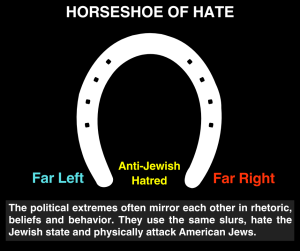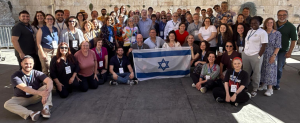
October 28, 2025
STAY INFORMED – TALKING POINTS – ACTIONS TO CONSIDER – STORIES MAKING NEWS
![]()

Gunshots rang out and moments later 11 American Jews lay murdered in their Pittsburgh synagogue. Now, seven years after the deadliest massacre of Jews in the U.S., hate against the American Jewish community has reached a fever pitch. Politicians and online influencers from both parties have too often minimized anti-Jewish (antisemitic) rhetoric and extremist messages. Most American Jews now consider antisemitism a “normal part of Jewish life.”
A recent Pew study found that while most Americans agree political violence is increasing, the majority attributes it to “the other side” – highlighting the deep polarization that hinders a shared moral responsibility. The result is a dangerous pattern in which rhetoric turns to reality – a test not only of Jewish safety, but of the civic and moral foundations that built our nation and hold it together.

Dangerous Political Rhetoric: Jews at the Epicenter
From right to left, recent incidents reveal how easily moral lines blur when hate is excused for partisan convenience.
“I love Hitler,” Nazi gas chamber jokes and racist slurs were among messages shared by Young Republican leaders in a private group exposed by Politico. The posts also mocked Blacks as monkeys and joked about sexual assault. The group included state young party chairs from Arizona, Kansas and NY.
U.S. House Speaker Mike Johnson “roundly condemned” the vile messages and said he did not believe the comments reflected the views of all young Republicans. Vice President JD Vance described the texts as “kids doing stupid things,” even though they were posted by adults. Many were asked to resign or lost their jobs. U.S. Task Force to Combat Antisemitism chair Leo Terrell reacted: “Antisemitism on the right is just as dangerous as antisemitism on the left.”
Nazi Tattoo Excused: ‘He made mistakes’
“I am not a secret Nazi,” was how Maine’s leading Democratic U.S. Senate primary candidate responded after he revealed his Nazi chest tattoo on a podcast. Graham Platner denied knowing that a skull-and-cross bones tattoo he got 18 years ago was associated with Nazi SS units. His former political director countered that “he knows what it means, he’s a military history buff.” CNN confirmed her account and reported that Platner defended Nazi tattoos in social media posts. As of Oct. 27, no Democratic senator had called for him to step down. Sen. Bernie Sanders reiterated his endorsement and Sen. Chris Murphy described him as “a human being who made mistakes.”
Controversies also emerged among Republican candidates. President Trump’s candidate to lead the Office of Special Counsel withdrew after reports surfaced of past bigoted comments. Paul Ingrassia declared that the Martin Luther King Jr. holiday should be “tossed into the seventh circle of hell” and “I have a Nazi streak in me.” The White House had continued to support him despite months of opposition from several Republican senators. He remains the White House liaison to the Dept. of Homeland Security.
The NJ Republican candidate for governor Jack Ciattarelli defended comments that his senior aide and Muslim relations advisor Ibrar Nadeem is not “taking money from Jews.”
Former Students for Justice in Palestine Leader Running for NYC Mayor
Concerns are mounting over Zohran Mamdani’s campaign for mayor of NY. The avowed socialist founded a chapter of the viciously anti-Israel Students for Justice in Palestine at Maine’s Bowdoin College in 2013. The national organization praised the Oct. 7 Hamas terrorist massacre of more than 1,200 people – including 46 Americans. Mamdani has refused to condemn calls to “Globalize the Intifada” – violent attacks against Jews – and has met with radical Islamic preachers. Despite this, he has received major endorsements from some Democratic party leaders including U.S. House Minority Leader Hakeem Jeffries.
More than 1,000 rabbis across America have signed onto a Jewish Majority letter, “Defending the Jewish Future,” warning that Mamdani’s rhetoric “delegitimizes the Jewish community and encourages hostility toward Judaism and Jews.”
All of these examples illustrate a bipartisan erosion of moral standards – where the instinct to promote a political agenda too often outweighs the duty to reject hate.

Public Climate: Hate as a ‘Normal experience’
The consequences of rhetoric targeting Jews are increasingly visible. A majority of Jews have accepted that anti-Jewish hate is a normal part of daily American life. Other key findings from the Anti-Defamation League and Jewish Federations of North America’s Portrait of Antisemitic Experiences in the U.S., 2024-2025:
These statistics are reflected in daily life. Recent attacks and calls for violence validate the concerns of American Jews. A group of 20 young teens shot pellet guns and called Jewish children at a Chicago playground “baby killers” on the recent Oct. 7 anniversary. Swastikas continue to be spraypainted on synagogues, businesses and parks across the country.
These trends reveal not only a crisis of safety – but a deeper struggle over national character. Yeshiva Univ. President Rabbi Dr. Ari Bermam: “Antisemitism is a symptom of a disease. The solution is core American values, which are actually core Jewish values. The canon that begins with the Bible, continues through the Western world with the values of freedom, democracy and human dignity – the values that America was built on.”
Path Forward: Jews and Their Allies Step Up
Despite serious concerns over the normalization of anti-Jewish hate, many U.S. Jews have responded by proudly displaying something distinctively Jewish and have sought a closer connection to the greater Jewish community – according to the ADL-JFNA survey. The reaffirmation of identity and belonging has become both a personal and civic expression of resilience.
The same spirit of renewal is emerging among faith and civic leaders, as well as senior elected officials. U.S. Sen. Ted Cruz addressed the annual Christians United for Israel Summit, urging believers to confront anti-Jewish hate from within their own ranks. “The church is asleep right now. In the last six months, I have seen antisemitism rising on the right in a way I have never seen in my entire life.”
There are more reasons for optimism beyond America. Sec. of State Marco Rubio spoke earlier this year about how hatred of the Jewish people is “the world’s oldest and most futile bigotry, and I pray for the day when the entire world will recognize this futility.” He recently visited Israel and spoke of historic opportunities to expand the Middle East’s Abraham Peace Accords: “There will be ups and downs, but we have many reasons to be optimistic.”
![]()

![]()

Each of us can help strengthen community safety, civic responsibility and the shared values that make America strong.
![]()

Largest-Ever American Zionist Movement Delegation at World Zionist Congress in Jerusalem
The American Zionist Movement – the U.S. affiliate of the World Zionist Organization – is attending the 39th World Zionist Congress Oct. 28 to 30, in Jerusalem. The WZO brings together Jewish leaders and delegates from more than 40 countries for the largest global Zionist gathering.
This year’s American delegation reflects the incredible diversity and vitality of Jewish life in the U.S. Spanning ages from 18 to 87, the delegation represents 22 states across the country. Among the U.S. delegation are rabbis, elected officials, educators and community leaders whose civic engagement and leadership embody the spirit of American Jewish engagement – diverse in perspective, united in purpose.

The MERCAZ Olami delegation at the Kotel before the start of the World Zionist Congress
Stories Impacting American Jews
Stories Impacting the U.S. and Israel
Stories from Around the World
Stay Informed | Speak Up | Take Action
Want to Read More of Our Talking Points? Did you miss a recent edition of The Focus Project? No need to search your inbox. Our most recently published editions are available on our website.
![]()

This content is developed by The Focus Project in partnership with MERCAZ USA. The Focus Project distributes weekly news and talking points on timely issues concerning Israel and the Jewish people, including antisemitism, anti-Zionism and the delegitimization of Israel. It represents a consensus view across a spectrum of major American Jewish organizations. MERCAZ USA recognizes and respects the diversity of views on these issues among its readers and the community at large.